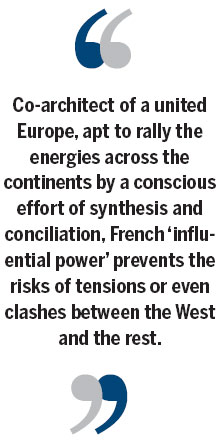The power of principles and values
Updated: 2013-04-12 08:25
By David Gosset (China Daily)
|
|||||||||||

A renewed Sino-French strategic partnership needs to take into account the reality of France's global influence
When Laurent Fabius makes his second official visit to Beijing as France's foreign minister soon, he will attempt to co-write a new chapter in Sino-French relations just as a profound redistribution of power affects his country's position internationally.
Outside France the idea of la grande nation is the object of the usual French bashing, while at home national decline is the subject of serious concern as three crises - economic, social and political - strike the country.
It is in this context that Fabius has been drawing on the idea of puissance d'influence, or influential power, to guide his diplomatic actions and, in a sense, he reinterprets the Gaullist affirmation of France's singular rayonnement, or influence, whose permanency contrasts with the vicissitudes inherent to politics, and the ups and downs of economic cycles.
"Influential power", Laurent Fabius says, is what makes France bigger than itself, and one should not simplistically gauge its standing by its weight. In other words, while France's rank, as measured by "hard power", may indeed be diminished, France is still playing a role proportionate to the significance of the universal principles it wishes to embody: liberte, egalite, fraternite.
This is a stimulating proposition in a world where power is associated with how much of it you have, in essence more qualitative than Joseph Nye's classification of power - hard, soft and smart - the concept of "influential power" reemphasizes the impact of principles and values in world politics.
With the coercion of "hard power" or the coopting inherent to "soft power" countries act in order to change the behaviors of other nations, but the causality of "influential power" is more complex, its source less in the hands or the mouth of a self-proclaimed leader than in the respectful eyes of those who attribute prestige and standing to others.
It was the Senegalese poet and statesman Leopold Sedar Senghor, who coined the term negritude and he of the "civilization of the universal", who viewed French as the idiom of a new humanism. The Academie francaise can defend the French language on the Left Bank in Paris but the true spirit of Francophonie, the French community of nations and regions, another element of "influential power", lives outside metropolitan France.
When the last grand master of the Chinese traditional painting, Fan Zeng, resurrects Victor Hugo in ink portraits, grandeur emanates as much from the recollection of his genius as from the resonance of his quest for justice, not French, not Chinese, but universal.
To be worthy of the Jeffersonian observation "Every man has two countries - his own and France", France cannot remain passive when barbarity threatens civilization. The nature of France's answer to what is happening in Mali or in Syria is also explained by a dual responsibility, to itself and to the world.
However, without a certain level of economic and military might, humanistic values are mere utopian ideals, and if France has always been a catalyst for European integration it is with the ambition that the union of Europe's small states enables the old continent to be of consequence in a world of giants.
Co-architect of a united Europe, apt to rally the energies across the continents by a conscious effort of synthesis and conciliation, French "influential power" prevents the risks of tensions or even clashes between the West and the rest. The rise of the BRICS is a highly positive trend, but a new type of rivalry between the West and the emerging world would be a major factor of instability for the world.
In Africa, while China's growing presence does not have to be a loss for the Euro-African relationship, work has to be done to better coordinate Chinese and Western approaches toward what is arguably the continent of the future.
Mali, and beyond, the Sahelian space, will not become the laboratory where China, Europe and Africa, with the explicit endorsement of the United Nations, invent 21st century cooperation for peace and social progress without a strong political understanding between Beijing and Paris.
A renewed Sino-French strategic partnership that takes into account the reality of France's "influential power" and the global implications of the Chinese renaissance is a guarantee against new lines of global fractures. South-South relations matter as much as North-North relations but they should be seen as two interdependent processes of a greater convergence.
For the French "influential power" and its constant dialogue with the universal, Europe is the indispensable intermediary between the nations and mankind, and Sino-European cooperation the necessary condition for global peace and solidarity.
The author is director of the Academia Sinica Europaea at China Europe International Business School, Shanghai, Beijing & Accra, and founder of the Euro-China Forum. The views do not necessarily reflect those of China Daily.
(China Daily 04/12/2013 page8)
Today's Top News
List of approved GM food clarified
ID checks for express deliveries in Guangdong
Govt to expand elderly care
University asks freshmen to sign suicide disclaimer
Tibet gears up for new climbing season
Media asked to promote Sino-Indian ties
Shots fired at Washington Navy Yard
Minimum growth rate set at 7%
Hot Topics
Lunar probe , China growth forecasts, Emission rules get tougher, China seen through 'colored lens', International board,
Editor's Picks

|

|

|

|

|

|





